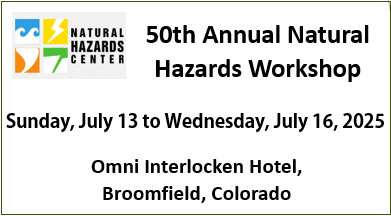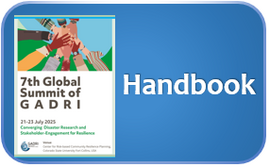Each group will pick-up a theme and the results will be reported by the rapporteur at the final panel sessions.
i. Target E – Governance - Substantially increase the number of countries with national and local disaster risk reduction strategies by 2020;
- Scientific knowledge to provide evidence for effective implementation of DRR policies
- Stock taking of current progress and status of science in the world
ii. Target F – Finance - Substantially enhance international cooperation to developing countries through adequate and sustainable support to complement their national actions for implementation of the present Framework by 2030;
- Meeting demands from policy makers and planners, and actions by science/scientists
- Emphasis on focus of science in the world today and learning by action
- Future directions for scientists to proceed towards action or practice of science
- Making action an academic concern by sharing available knowledge and targets for implementation by policy makers
iii. Post-Covid-19 Era - Health Disaster Risk Reduction and Management – Responses and measures to Covid-19 – reports or national synthesis reports on Covid-19 – lessons learned and research gaps; and global pandemics – what is next?
iv. Action Orientated Agenda Regards Integrated Disaster Risk Reduction and Climate Change Adaptation for the Next Decade - Surveying GADRI’s entire membership worldwide regards risk reduction, adaptation and resilience initiatives for a written statement draft at the GADRI summit, and feed into the process of COP26 using some of the UK hosting mechanism.
v. Accessibility of information, data, reaction to disasters, and knowledge in the absence of a system to react and respond to the situation
vi. Evaluating obstacles for scientist engagement with policy makers and practitioners, and legal challenges - Scientists and Actors Engagement Projects
- This session introduces on-going projects with the substantial engagement between scientists and actors. Scientists are expected to contribute to improve decision of actors. Presentations will provide lessons and hints how scientist and actors can effectively communicate.
vii. Exploring solutions to bridge the gaps for implementation of science in action - Route from scientific prediction to social implementation: how can we bridge the last but not least gap between academia and society for accomplishing disaster risk reduction –
- In predictions of flood or landslides in some specific cases, outputs from scientific research can provide info of spatio-temporal changes in hazard with a level of quality that is ready for application. However, actual implementation of these scientific outcome is still tough in some aspects such as law, economic repercussion, and acceptability by local residents. Discussion is needed for such final gaps remaining on the route from academia to society for accomplishing disaster risk reduction.
- Celebration of the 10th Anniversary of GADRI on 20 July 2025
- 7th Global Summit of GADRI from 21 to 23 July 2025







